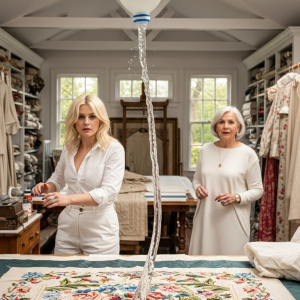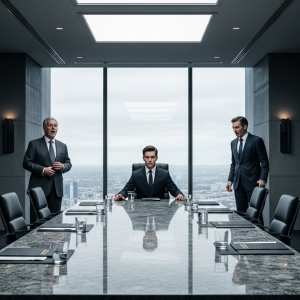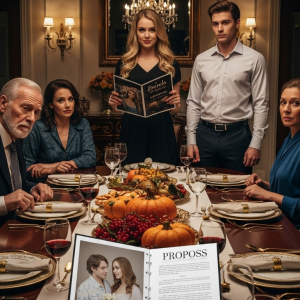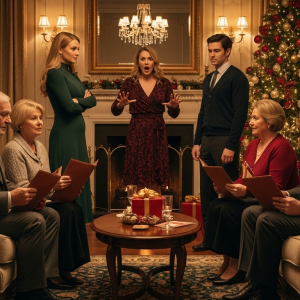Robert Miller measured his days by the sun creeping across his worn oak floors and the steady rhythm of turning pages. Retirement, after forty years of teaching high school science, was a quiet harbor. His house, a modest bungalow filled with more books than furniture, was a testament to a life lived for knowledge, not for material gain. It was a life of quiet dignity.
That dignity was something his son-in-law, Kevin, could never comprehend. Kevin was a man built of sharp angles, expensive suits, and a cologne that announced his arrival three seconds before he did. A young, aggressive stockbroker, he moved through life like a shark, convinced that still waters held no value. He saw Robert’s tranquil existence not as peace, but as failure.
“Dad, you’re sitting on a gold mine and letting it collect dust!” Kevin would often say, gesturing dismissively at Robert’s simple home during his obligatory Sunday visits with Laura, Robert’s daughter. “That pension fund of yours… it’s pathetic. Let me manage it. I’ll get you a 20% return in six months. This ‘safe, diversified’ strategy is for people who are afraid to win.”
Robert would just smile, a patient, knowing look in his eyes. “I’m comfortable, son. Winning for me is having the time to read a good book.” This response would only infuriate Kevin further, who saw it as the ramblings of an old man out of touch with reality.
Laura, caught in the middle, would offer a weak smile, embarrassed by her husband’s brashness but also subtly swayed by his world of fast money and tangible success. She loved her father, but she couldn’t help but wish he had a little more… ambition.
Unseen by them, Robert’s quiet life had a hidden current running through it. Every few weeks, he would receive a phone call. He would retreat to his study, close the door, and his voice would be low and full of warmth. “Leo, my boy, how’s the project coming along?… No, no, don’t you worry about me… You just focus on changing the world.” He never explained who “Leo” was, and no one thought to ask. It was just one of Robert’s quirks, a connection to a past they didn’t care to explore.
The retirement party was Laura’s idea, a gesture of love held in a modest, rented event hall. It was filled with Robert’s people: graying former colleagues who shared inside jokes about faculty meetings, and bright-eyed former students who credited “Mr. Miller” with sparking their passion for science. The air was warm with genuine affection.
Kevin, naturally, stood out. He had brought his own bottle of vintage champagne and was holding court with a few of Laura’s cousins, loudly dissecting the stock market. After a few glasses, his confidence swelled into arrogance. When Laura announced it was time for toasts, Kevin strode to the front of the room, raising his glass.
He started with false sincerity. “To Robert. A man who dedicated his entire life to… teaching. Forty years. Wow.” He paused, letting the feigned admiration hang in the air before it curdled.
“He taught us all the value of hard work and saving your pennies. And now, he gets to enjoy the fruits of that labor.” Kevin’s eyes swept the room, a smirk playing on his lips. He was performing now, not for Robert, but for everyone he considered an audience.
Then came the final, patronizing blow. “So here’s to you, Dad! You’ve worked your whole life for… well, for today. I just hope the pension is enough to get you through.” He gave a theatrical sigh. “But don’t you worry,” he said, locking eyes with Robert, “If the well ever runs dry, I’ve always got a seat for you on my gravy train. I take care of family.”
A wave of uncomfortable silence washed over the room. A few of Kevin’s acolytes chuckled nervously. Laura’s face was flush with shame. It was a public declaration of dominance, an act of pity disguised as generosity, and it was aimed directly at the heart of Robert’s quiet pride.
Robert did not flinch. He did not scowl. He simply met his son-in-law’s condescending gaze with a calm, enigmatic smile and took a slow sip of his water. His composure was a shield that Kevin’s verbal darts couldn’t penetrate. It was the calm of a man who knew the storm was coming, but also knew he was safely on high ground.
Laura shot her husband a furious look, but Kevin was too pleased with himself to notice. He was the king of his own small, financial universe, and he had just, in his mind, put the old man in his place.
Just then, a quiet buzz emanated from Robert’s pocket. He discreetly pulled out his old smartphone. A news alert had illuminated the screen. He read the headline, and his serene smile widened, just a fraction. A distinct glint appeared in his eye, the look of a chess master who has just seen his opponent walk directly into a trap set twelve moves ago.
He didn’t hurry. He let the moment breathe, let Kevin continue to soak in what he believed was his triumph. He watched as his son-in-law accepted pats on the back from men half his age who were impressed by his bravado.
Robert took another sip of water, a silent toast to a twenty-year-old gamble. A gamble not on a stock, or a trend, or a market fluctuation, but on a person. On a brilliant, impoverished boy with a mind like a supernova, a boy everyone else had written off. A boy named Leo.
Kevin, noticing Robert’s focus on his phone, couldn’t resist one final jab. He sauntered over, his voice loud enough for the nearby tables to hear.
“What’s that, Dad? Checking your social security deposit date? Don’t worry, I’m sure it’ll hit the bank on time.”
The room fell quiet again, sensing another confrontation. Robert slowly folded his reading glasses and placed them in his breast pocket. He pushed his chair back and stood up, not with the weariness of a retiree, but with a sudden, commanding stillness.
“Actually, Kevin,” Robert said, his voice perfectly level but cutting through the tension. “This might interest you. It’s a story about a little tech company I’ve been following. An article from The Wall Street Journal.”
The mention of the prestigious financial paper gave Kevin a moment’s pause. He peered at the phone with mild curiosity, expecting some small market news.
Robert turned the screen so that Kevin, Laura, and the entire table could see it. The headline was massive, a digital bombshell in bold, black letters:
“TECH GIANT GOOGLE ACQUIRES GENESIS AI IN LANDMARK $5 BILLION DEAL.”
A gasp rippled through the onlookers. Kevin’s eyes widened. He knew Genesis AI. It was the unicorn startup that had come out of nowhere, the holy grail of the tech world. He had tried and failed for months to get his clients a piece of it.
But Robert wasn’t finished. With a deliberate tap of his thumb, he scrolled down, past the headline, to the main feature image in the article.
It was a photograph of a beaming, charismatic young man in a hoodie, shaking hands with an older man in a simple tweed jacket. The young man was the celebrated billionaire founder of Genesis AI. The older man was Robert.
Kevin stared, his mind refusing to process what he was seeing. Then, Robert’s finger tapped the screen one more time, enlarging the caption so it was impossible to miss.
“Genesis AI founder Leo Reisner, pictured here with his mentor and first angel investor, retired science teacher Robert Miller. Miller’s initial seed investment of $50,000, his entire life savings at the time, is now valued at over $200 million following the acquisition.”
The sound in the room was absolute silence. Not an awkward silence, but a profound, deafening silence filled with the thunder of a world being turned upside down.
Kevin’s face, moments before flushed with arrogant pride, turned a ghastly shade of white. The confident smirk melted away, replaced by a slack-jawed gape of utter disbelief. His image, the carefully constructed persona of the financial genius, the man who understood how the world really worked, shattered into a million pieces. In a single moment, he had been exposed for what he was: a loud, arrogant fool, blind to the true nature of the man he had been mocking.
Laura stared, her eyes flicking from the phone screen to her father’s calm face. The image of him as a simple, slightly hapless retiree was wiped away. In its place was the image of a titan, a man of incredible foresight and even more incredible faith. He hadn’t just made money; he had built a future. The emotion flooding her was not just surprise. It was a deep, soul-shaking awe.
The silence broke. Whispers turned into excited exclamations. The guests, who had been politely keeping their distance, now surged toward Robert, their faces alight with questions and congratulations. He was no longer just “Mr. Miller,” the retired teacher. He was Robert Miller, the quiet architect of a legend. Kevin was left standing alone, an island in the middle of a celebration he couldn’t comprehend, his vintage champagne tasting like ash in his mouth.
Robert Miller didn’t buy a yacht or a mansion. He bought a new, slightly more comfortable armchair for his reading nook and set up a state-of-the-art physics lab at his old high school. His newfound wealth didn’t change who he was; it amplified it.
He used the vast majority of his fortune to establish the “Miller Prize for Young Innovators,” a foundation dedicated to providing seed capital and mentorship to gifted students from underprivileged backgrounds—the next generation of Leos who needed someone to believe in them.
Laura became a frequent visitor at her father’s house, not out of duty, but out of a deep and newfound respect. She would help him sort through the brilliant, ambitious applications for the prize, her husband’s world of “quick flips” and “short squeezes” feeling more and more hollow with each passing day.
One afternoon, as they sat on his porch reviewing a proposal for a new type of biodegradable plastic, she finally found the words. “Dad… I’m so sorry. For all the times I didn’t understand. For letting Kevin…”
Robert reached over and patted her hand, his smile kind and free of any lingering resentment. “Wealth isn’t about what you have in the bank, Laura. It’s about what you can build in others. Kevin just never understood the difference between a stock price and a person’s value.”
He looked out at the quiet, tree-lined street, the same street he had lived on for forty years. He wasn’t just a retired teacher anymore. He was a kingmaker, a silent guardian of dreams. He hadn’t just secured his own future; he had taught his family a priceless lesson about the power of vision, the currency of faith, and the extraordinary returns of investing in human potential.
The drive back from the party was a tomb of silence. Laura stared out the passenger window, the city lights blurring into streaks of gold and red, her mind replaying the moment her father turned his phone screen. It wasn’t just the money; it was the look in his eyes—a quiet, unshakeable confidence she had mistaken for simple contentment her entire life.
Kevin gripped the steering wheel so tightly his knuckles were white. He wasn’t silent out of shame or reflection. It was the silence of a pressure cooker before it explodes. He drove two blocks, then three, before he finally slammed his palm against the leather-wrapped wheel.
“He played me,” Kevin snarled, his voice a low, vicious growl. “The old man played me for a fool. All these years, acting like some broke schoolteacher… he was sandbagging me. He wanted to humiliate me.”
Laura turned to him, her expression unreadable. For the first time, his anger didn’t intimidate her or make her want to smooth things over. It just sounded… pathetic.
“He didn’t say a word, Kevin,” she replied, her voice eerily calm. “He didn’t have to. You did all the work. You spent the last five years mocking his life, his choices, his intelligence. Tonight, you handed him the microphone and begged him to prove you wrong. And he did.”
“So you’re on his side now? Just like that? The money comes out and suddenly he’s a saint?” Kevin shot back, his words dripping with venom.
“This isn’t about sides,” Laura said, a profound weariness in her tone. “This is about reality. My father invested his life savings in a brilliant kid nobody else believed in. You invest your clients’ money in volatile stocks you hope will pop before they drop. You don’t see the difference? One is about building something. The other is just… a bet.”
Kevin had no answer for that. He just drove on, the silence in the car now heavier than ever, filled with the weight of everything he had failed to understand. The chasm between them had been there for years, but tonight, Laura had finally dared to look down and see how deep it truly was.
In the weeks that followed, the family’s entire gravitational pull shifted. Kevin became a ghost in his own home. He would leave for work before Laura woke up and return late, burying himself in market reports and financial news, as if trying to find a win big enough to erase his public defeat. He stopped talking about his “big deals.” He had lost his swagger, and without it, he seemed smaller, angrier.
Laura, conversely, began to blossom. She spent two or three afternoons a week at her father’s house, not as a daughter performing a duty, but as an eager apprentice. She helped him set up the foundation’s charter, read through initial proposals, and listened, captivated, as he explained his philosophy.
“I wasn’t just teaching them physics, Laura,” Robert explained one afternoon, holding up a student’s crudely drawn but brilliant design for a water-purification system. “I was teaching them how to see the world not as it is, but as it could be. Leo was the best I ever had at that. He didn’t just see code; he saw a new way for people to connect.”
She was seeing her father for the first time: not as the man who fixed her bicycle chain or helped with her homework, but as a visionary who saw potential where others saw only poverty or inexperience. He was a cultivator of human talent, a far more complex and valuable skill than cultivating a stock portfolio. Each visit with him felt like coming home to a truth she had long ignored, making the return to her own silent, resentful house all the more jarring.
About a month after the party, Kevin showed up at Robert’s bungalow unannounced. He was wearing one of his most expensive suits, a piece of armor for a battle he was about to lose. Robert was in his garden, tending his tomato plants, and he greeted Kevin with the same calm neutrality as always.
“We need to talk,” Kevin said, skipping any pleasantries. He followed Robert inside.
He didn’t apologize. A man like Kevin saw apologies as admissions of weakness. Instead, he came with a proposition, his last-ditch effort to reclaim control of the narrative.
“Look, I was wrong about you,” Kevin began, the words sounding like they were being dragged from his throat. “You’re a genius. A silent killer. I respect that. So let me help you. You can’t have two hundred million dollars sitting in a checking account. It’s financial malpractice.”
He placed his designer briefcase on the coffee table. “We can set up a family office. Trusts, tax shelters, offshore accounts… I can make that two hundred million into a billion inside of ten years. It’s what I do, Robert. Let me do it for you. For the family.”
Robert listened patiently, a faint, sad smile on his face. Kevin still didn’t get it. He thought the victory was about the money. He was trying to buy his way back to relevance, to prove that even Robert’s fortune needed his expertise to be truly powerful.
Just as Robert was about to respond, there was a light knock on the door. He opened it to reveal a young man in a simple grey t-shirt and jeans, holding a bag of takeout. It was Leo Reisner, the tech billionaire.
“Mr. Miller! Sorry I’m late, the traffic was insane,” Leo said warmly, stepping inside. “I brought that Thai food you like.” He then noticed Kevin, extending a hand politely. “Hi, I’m Leo.”
Kevin froze, his hand shaking slightly as he shook Leo’s. He was standing face-to-face with the man whose genius had undone him, and that man was treating his father-in-law with the reverence one would show a king.
“Leo, this is my son-in-law, Kevin,” Robert said simply. “He was just offering to manage my… windfall.”
Leo smiled. “That’s great. But you know Mr. Miller,” he said, turning to Kevin, “his real genius isn’t in making money, it’s in creating value. He taught me that the first check you write shouldn’t be for a sports car, but for the person coming up behind you.” He then turned back to Robert. “Speaking of which, I looked over the plans for the school’s new robotics lab. I have a few ideas that could triple its impact. Let’s eat, I’m starving.”
They sat at the simple kitchen table, and Leo and Robert immediately launched into an excited discussion about quantum computing and educational theory, spreading blueprints and napkins with notes scrawled on them. They were talking about building the future.
Kevin stood there, his billion-dollar proposal forgotten, his expensive suit feeling like a cheap costume. He was a man who spoke the language of money in a room where the only currency that mattered was ideas and impact. He was utterly, hopelessly irrelevant. Without a word, he picked up his briefcase and walked out the door.
Laura arrived a few minutes later, seeing Kevin’s car speeding down the street. She found her father and Leo laughing over a container of Pad Thai, their conversation a vibrant tapestry of innovation and hope. She quietly joined them, listening, learning.
She looked at her father, a man who had lived his life in a modest home but whose influence now spanned the globe. He hadn’t just inherited a fortune; he had created one through an act of faith. And his real legacy wasn’t the money. It was the foundation, the robotics lab, the generations of students like Leo he had empowered.
That, she finally understood, was her true inheritance. Not a trust fund or a stock portfolio, but a lesson in what it truly meant to be rich. It was the quiet, unshakeable knowledge that the greatest investments are not in things that can be bought or sold, but in the limitless potential of the human spirit.




